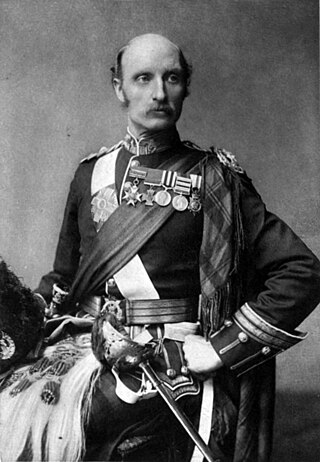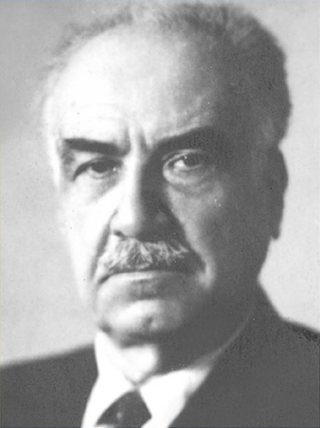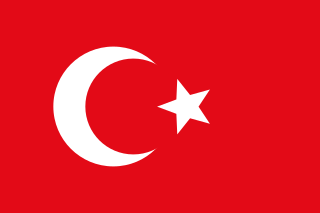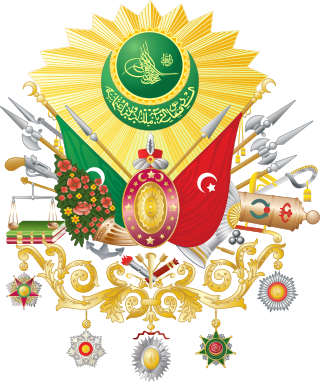
General Sir Ian Standish Monteith Hamilton, was a senior British Army officer who had an extensive British Imperial military career in the Victorian and Edwardian eras. Hamilton was twice recommended for the Victoria Cross, but on the first occasion was considered too young, and on the second too senior. He was wounded in action at the Battle of Majuba during the First Boer War, which rendered his left hand permanently injured. Near the end of his career, he commanded the Mediterranean Expeditionary Force in the Gallipoli Campaign of the First World War.

Field Marshal Sir George Stuart White, was an officer of the British Army. He was stationed at Peshawar during the Indian Mutiny and then fought at the Battle of Charasiab in October 1879 and at the Battle of Kandahar in September 1880 during the Second Anglo-Afghan War. For his bravery during these two battles, he was awarded the Victoria Cross. He went on to command a brigade during the Third Anglo-Burmese War in 1886 and became commander of Quetta District in 1889 in which role he led operations in the Zhob Valley and in Balochistan. He was commander of the forces in Natal at the opening of the Second Boer War and fought at the Battle of Elandslaagte in October 1899. He commanded the garrison at the siege of Ladysmith: although instructed by General Sir Redvers Buller to surrender the garrison he responded "I hold Ladysmith for the Queen" and held out for another four months before being relieved in February 1900. He finished his career as Governor of Gibraltar and then as Governor of the Royal Hospital Chelsea.

Mustafa Fevzi Çakmak was a Turkish field marshal (Mareşal) and politician. He served as the Chief of General Staff from 1918 and 1919 and later the Minister of War of the Ottoman Empire in 1920. He later joined the provisional Government of the Grand National Assembly and became the Deputy Prime Minister, Minister of National Defense and later as the Prime Minister of Turkey from 1921 to 1922. He was the second Chief of the General Staff of the provisional Ankara Government and the first Chief of the General Staff of the Republic of Turkey.

Ahmed Djemal, also known as Djemal Pasha, was an Ottoman military leader and one of the Three Pashas that ruled the Ottoman Empire during World War I.

Field Marshal William Gustavus Nicholson, 1st Baron Nicholson, was a British Army officer who served in the Second Anglo-Afghan War, the Mahdist War, the Third Anglo-Burmese War, the Second Boer War and the First World War. He became Chief of the Imperial General Staff and was closely involved in the reorganisation of the British Army in the early years of the 20th century.

General Sir John Eccles Nixon was a senior commander of the British Indian Army. He gave the orders for the ultimately disastrous first British Expedition against Baghdad during the First World War.

Ahmed Izzet Pasha, known as Ahmet İzzet Furgaç after the Turkish Surname Law of 1934, was an Ottoman general during World War I. He was also one of the last Grand Viziers of the Ottoman Empire and its last Minister of Foreign Affairs.

General Sir Beauchamp Duff, was a Scottish officer with a distinguished career in the British Indian Army. He served as Commander-in-Chief of India during the First World War. His role in the disastrous expedition to Mesopotamia was criticised, helping to end a long career.

ViscountTakashima Tomonosuke was a samurai of Satsuma Domain, general in the early Imperial Japanese Army, and a cabinet minister in Meiji period Japan. Part of Sophia University in Tokyo is located on the site of his house.

Mihail Georgiev Savov was a Bulgarian general, twice Minister of Defence, second in command of the Bulgarian army during the Balkan Wars.

Viscount Ōshima Yoshimasa was a general in the early Imperial Japanese Army during the First Sino-Japanese War and the Russo-Japanese War. His great-great-grandson, Shinzō Abe was Prime Minister of Japan.

Pyotr Semyonovich Vannovsky was a Russian statesman and military leader of Belarusian extraction, who served in the Imperial Russian Army. He was also an honorary member of the Academy of Military Medical, the Mikhailovsky Artillery School, the Mykolaiv Engineering School, the Imperial Academy of Sciences, and a full knight of the Order of St. Vladimir.

Sava Atanasov Mutkurov was a Bulgarian officer and politician. One of only three recipients of the Order of Bravery 1st grade, he was among the chief architects of the Bulgarian unification (1885) and, as an officer in the young Bulgarian Army, one of its defendants in the Serbo–Bulgarian War (1885). He also served as one of the regents of the Principality of Bulgaria after Prince Alexander of Battenberg's abdication (1886–1887) and was Minister of War in Stefan Stambolov's government (1887–1891).

Yemen Vilayet was a first-level administrative division (vilayet) of the Ottoman Empire. At the beginning of the 20th century it reportedly had an area of 200,000 square kilometres (77,200 sq mi). The population for the vilayet is given by the 1885 Ottoman census as 2,500,000.

The leaders of the Central Powers of World War I were the political or military figures who commanded or supported the Central Powers.

The Ottoman Army was the army of the Ottoman Empire after the country was reorganized along modern western European lines during the Tanzimat modernization period. It operated during the decline and dissolution of the empire, which roughly occurred between 1861 and 1918, the end of World War I for the Ottomans. The Crimean War was the first war effort in which the modern army took part in, proving itself as a decent force. The last reorganization occurred during the Second Constitutional Era.
Kör Yusuf Ziyaüddin Pasha, also known as Yusuf Ziya Pasha, was an Ottoman statesman of Georgian origin, who twice served as the Grand Vizier of the Ottoman Empire in 1798–1805 and 1809–1811. Before, between and after his terms as grand vizier, he served numerous posts as governor of various provinces and districts throughout the empire. As grand vizier, he commanded the Ottoman ground forces against the French Army in the Ottoman reconquest of Egypt and later served as a commander in the Ottoman wars with the Russian Empire.
Mihailo Zivković-Gvozdeni was a Serbian general and a minister of war.

Milutin Marinović was a Serbian and Yugoslav army general.

Sagheer Hamoud ِAhmed Aziz, sometimes spelled "Sagher Hamood,or Saghir", commonly known as Sagheer bin Aziz, is a Yemeni politician, MP, and military officer. He is the current chief of the Yemeni Armed Forces Staff. He is also a GPC member in the Yemeni Parliament, for the parliamentary session 2003–2009 for constituency No. (280) B Amran Governorate, north Yemen. On 28 February 2020, he was appointed as Chief of the General Staff of the Yemeni Army and promoted to Lt. Gen.

















